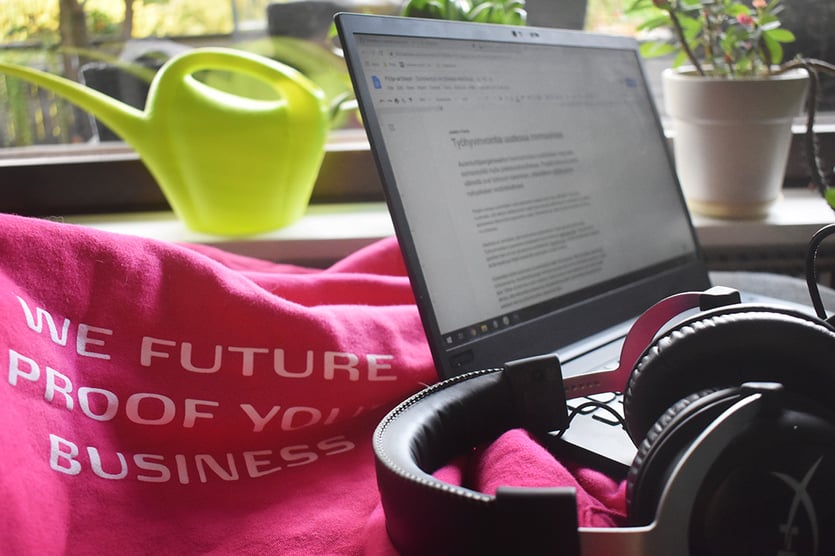
Great management can take care of well-being in an expert organization even under exceptional circumstances.
At Pinja, well-being at work comes from supporting the ability to work, remote exercising in the work community and modern communication tech.
According to a recent survey, well-being at Pinja is at a good level even during remote work. This is great news considering that changing to remote work has taken its toll since we are spending less time together and in some cases, we have poorer ergonomics while working now. I’d like to tell you how we keep up work motivation during these changes.
What's essential is to understand that managing well-being is not a sprint race. Well-being at work cannot be improved by cheering with champagne glasses. Improving well-being is like building up fitness: You can get better at sprinting pretty quickly but it takes a few years to build up enough endurance for a marathon.
Essentials such as occupational health care and management work must be in good order first since they are the base on which well-being at work is built. Following trends that emerge from personnel surveys has played an important role for years now. Even though many didn’t believe it at first, numbers in the past few years have shown that by monitoring absences and taking care of their causes can help bring the number of absences down - and increase well-being at work at the same rate.
At Pinja, well-being is regularly monitored through the Työvire (work motivation) survey. Recent results from September show that 64% of the respondents consider their motivation to work to be high. These figures are in line with results from June and from February before corona.
We put a lot of importance on the responsibility of management; we’re not trying to act like an organization in which all management roles have been completely eradicated. For years, Pinja has been the target company in the HeRMo research project by the University of Jyväskylä that studies flexible and ethical personnel management in creative companies. Our antennas are always out, and we aim to continuously improve.
Management is needed even in expert organizations
The Ethical Human Recourse Management and Leadership enabling Creative Practices in Start-Up Organizations project (HeRMo) by the University of Jyväskylä delved into Finnish company culture through interviews, observations and surveys. Kaija Collin and Soila Lemmetty edited a book based on the study called Siedätystä johtamisallergiaan! Vastuullinen johtajuus itseohjautuvuuden ja luovuuden tukena työelämässä that was published last autumn. (transl. (Desensitization for management allergies! Responsible management supporting self-direction and creativity at work)
Collin and Lemmetty's book gives further insight into the management and supervision work at Pinja. Human resources manager Johannes Nikula emphasizes that one of the main points of his article is how important management is even in expert organizations. Management plays a big role especially when the organization is undergoing change. The exceptional circumstances around the world and the start of remote work that were caused by corona were changes that no one could have predicted at the time of writing the book.
When big changes happen, an expert organization that has been designed to be self-directing can struggle without management. There might be conflicts in the company and even feelings of insecurity. Management and supervision are needed especially under exceptional circumstances.
Pinja’s different business operations have tried and tested many management methods like large teams, independent and entrepreneur-like units and even tried removing supervisors completely. As the company has grown and its focuses have changed, experience has shown that expert work requires immediate management to support the daily work of self-directed expert work.
We train our experts to be managers. They undergo orientation training which is important especially at the early stages when they haven’t yet had much experience in management work. We have noticed that it helps if the manager knows the sector on which their team works and can take part in the expert work themselves.
We have noticed that it helps if the manager knows the sector on which their team works and can take part in the expert work themselves.
Productivity comes from well-being
At Pinja, the management of long-term well-being comes from our aim at good employee productivity. Good management is at the heart of productivity. Functional management helps employees feel secure which is necessary in order to maintain the ability to work. Competence is born out of the employees’ opportunities for continuous self-development and motivation to feel that their work is meaningful.
Personnel costs are often one of the biggest single areas of expenses in expert organizations. On the other hand, in expert organizations profit comes from knowledge which makes personnel the most important resource for productivity. Employee productivity means that healthy and motivated experts get results. Work is productive when it focuses on what's important in the context of goals. This can be accomplished when human resources are in good order.
Pinja utilizes the QWL index in their surveys that was developed by Marko Kesti, an associate professor at the University of Lapland. It defines the physical and emotional sense of security of employees as the most important factor in the ability to work. This means that the ability to work cannot be improved with individual campaigns but that everyday activities at the company must be in good order and that employees should enjoy coming to work.
Exercise and community activities improving motivation

Before corona, many Pinja locations had fixed ways of maintaining community and well-being at work. These methods included cycling trips and walks or playing floorball or padel every week. The work community also came together for LAN parties and in some locations they brewed beer together.
Even now that we’re working from home, we still have our ways of building well-being at work through exercise. Good management is required to bring up these ideas, create a feasible framework for them and get people excited. These days, you could call us a cycling company. Our most enthusiastic employees go cycling. rain or shine, if it looks like a colleague might be clocking in more miles than them. Everyone marks their cycling trips on the system, and over 30 cyclists have joined. We cycle alone but other people’s results are still interesting to see and they are closely followed.
During corona, small ways to maintain well-being are practiced every week, such as being reminded of coffee breaks on Slack on the computer or cellphone. Slack is widely used in the Pinja community with many available channels and nothing stopping employees from starting new channels. This aims to help avoid the sense of detachment that threatens many remote workers and maintain a good work community. In their free time, some teams have also arranged game nights through remote connections.
During working hours, we have sometimes used video calls to arrange remote presentations like brief reviews of currently ongoing projects or relevant topics. In addition, we have arranged guided stretching breaks every week. Work ergonomics is often a problem in remote work, and stretching can help prevent knots.
Only time will tell how many of these good practices that we’ve started during these circumstances will still be utilized in the future. One thing is for sure: Taking care of well-being at work pays itself back.
How to achieve good well-being at work?
- Occupational health care must be in order and operating
- Regular Työvire (work motivation) surveys and improving operations
- Continuous development of management
- The importance of good management under exceptional circumstances
- Motivating work tasks
Read more
A Lead Architect thrives at the deep end of coding
Data analyst visualizes data and promotes effective decision-making
Building workplace wellbeing
Influence of business culture and leadership on wellbeing at work
Check out open positions at Pinja
Back to the Pinja Blog
Categories
- Career at Pinja (68)
- Manufacturing (46)
- Knowledge Management (45)
- Production Development (44)
- Software Partnership & Tools (42)
- Sustainability (37)
- Wood and Forestry (37)
- Bioenergy and Recycling (29)
- IT Support and Outsourcing (24)
- Ecommerce (23)
- Maintenance (22)
- Artificial Intelligence and Machine Learning (15)
- Public Services (9)
- Compliance (1)
